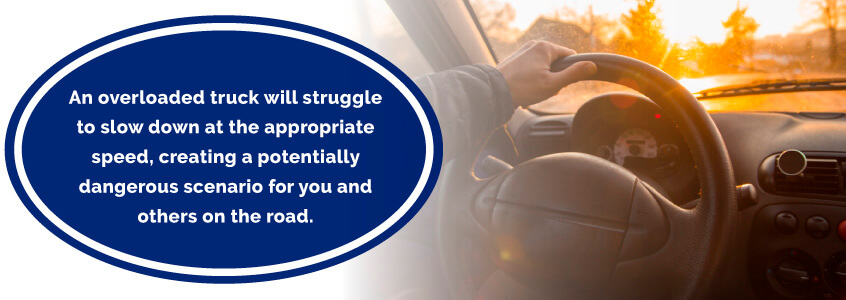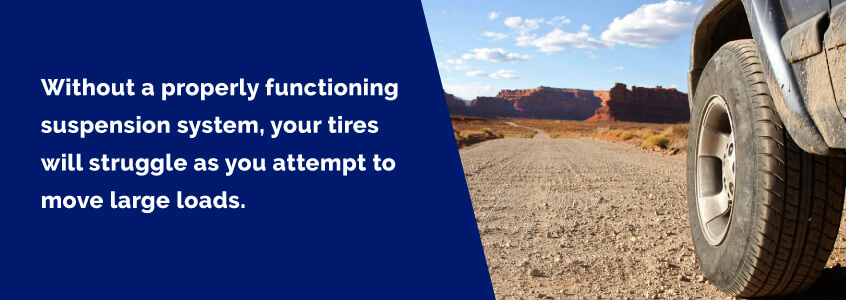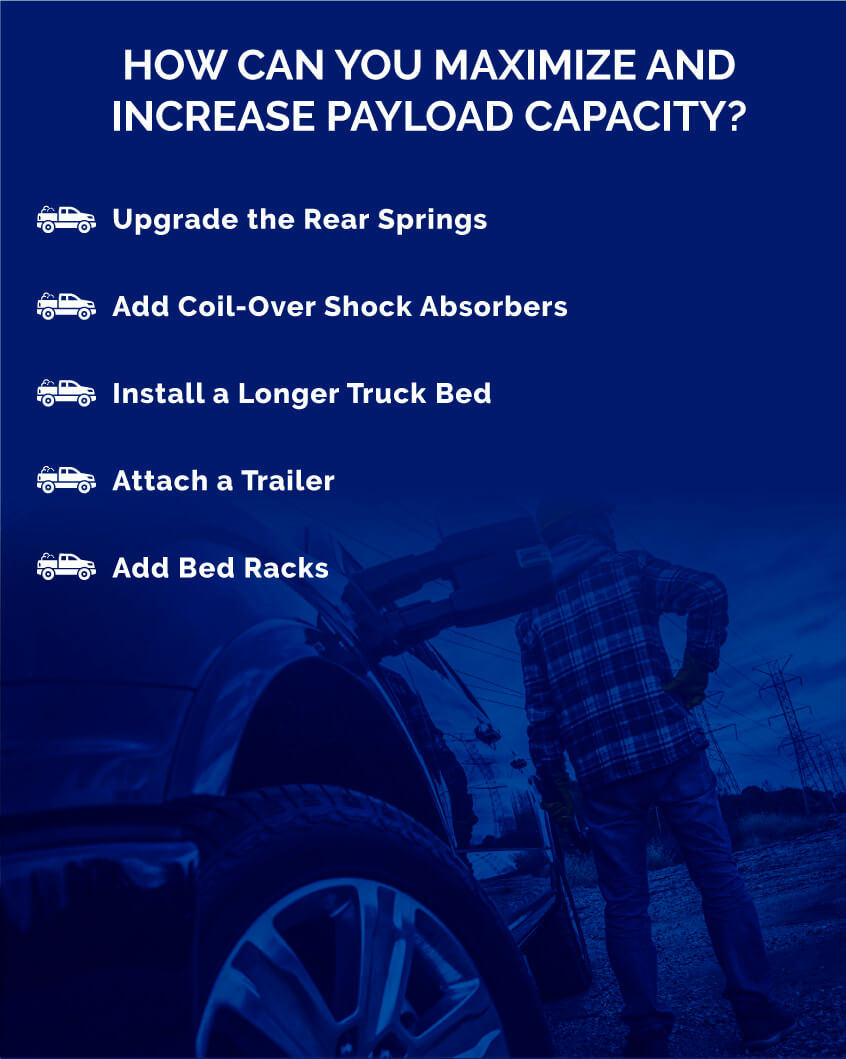
Your truck is a mean machine that doesn't back down from a hard day of
work. If you're like most truck owners, you expect your vehicle to be in it
for the long haul, keeping you and your load safe and secure mile after
mile. Although your pickup truck can surely pull its weight and more when
asked, overloading your truck is not a smart choice.
We're all guilty of loading up as much as we can in the back of our pickup trucks on occasion. While an accidental or purposeful overload once or twice is bound to happen, exceeding the rated load weight for your truck increases your chances of damaging the vehicle. These damages can leave you stranded, cost you money and damage the contents of your load. Take it from the pros at General Spring — you don't want to find out what happens if you consistently or substantially overload a truck.
10 Signs Your Truck Is Overloaded
How often do you weigh a load before you place it in the bed of your pickup
truck? Whether you use your truck for work or for transporting personal
belongings, most truck owners know that exceeding the payload capacity is
not recommended. Although they understand that they should stay beneath
this limit, some aren't aware of the telltale signs of an overloaded truck.
Here are ten easy ways to tell if a truck is overloaded.
- Your truck looks overloaded: We've all watched an overloaded truck huff and puff down the street with a sagging rear and a haul nearly bouncing over the edge of the bed. Load your pickup truck responsibly and don't overfill it. You can always make a second trip but you won't be able to complete your first trip if your suspension gives out.
- You weigh your truck and discover you've exceeded its payload capacity: It should go without saying that if you ever weigh your truck and discover that it's overloaded, you should remove items.
- The truck takes longer to slow down: An overloaded truck will struggle to slow down at the appropriate speed, creating a potentially dangerous scenario for you and others on the road.
- Your tires are showing premature wear: Although many truck owners look to the suspension system for the first signs of damage from an overloaded truck, the tires will also tell a tale of too much payload. Premature wear on your tires could be a sign of frequent overloading.
- The back of the truck is slouching: Whether you're driving or parked, you don't want your rear to slouch. Too heavy of a load can put too much stress on the suspension system and cause the rear to sag.
- You hear creaking or squeaking while you drive: Odd noises are never a good sign, especially when you've got a full load in your truck bed. Pay attention to these noises and consider inspecting your leaf springs after driving with an exceptionally large load.
- Your truck's suspension isn't bouncing: When you haul a load, your truck bed should bounce a little as the suspension carries the weight. A stable tuck bed with a large load is a sure sign that there might be a problem with your suspension system.
- Maintaining steering control is difficult: If you find that handling your truck is more difficult after filling up your truck bed, you may have overloaded it. As other problems can also cause difficulty handling, make sure that an excessive payload was truly the issue before you continue driving.
- You feel the rear bumper scrape the pavement while you drive: Aside from the bad dips and bumps in the road that tend to give any car a bumpy ride, your rear bumper shouldn't be low enough to the ground to scrape the pavement. If you're hauling a load and you're hearing the back bumper hit the asphalt more than once, chances are you've overloaded the bed.
- You have a feeling you've overloaded the truck: While we don't expect anyone to be able to calculate the exact weight of a load with the naked eye, most truck owners who regularly haul significant loads have an idea of when they've pushed the limit. If you have a feeling that you've added a little too much to your load, play it safe and remove some weight.
Have you noticed any of these ten signs of truck overloading on someone else's or your own vehicle? Vehicle manufacturers conduct multiple tests to determine the payload capacities of their trucks. They encourage drivers to adhere to these limits for safety reasons and so that the vehicles stay in great shape for as long as possible. What happens if you overload a truck despite the manufacturer's rating? In short, nothing that you want to experience firsthand.
What Happens if You Overload a Truck?
At General Spring, we understand that it's easy to accidentally overload your truck from time to time. Whether you're in a rush, misjudge the payload or are unaware of the capacity rating for a truck you're driving, there are many instances in which you may be unaware of an overload. Sometimes, an overload may simply be unavoidable. However, all truck owners should know that what happens if you overload a truck can often be problematic, expensive and dangerous.
1. You Can Damage Your Truck
One surefire way to increase the probability of damaging your truck is to overload it. The components that support your suspension system play a vital role in preserving the performance of your vehicle. By overloading your vehicle, you can cause these components to break and fail much sooner than their expected lifespan. The components significantly impacted by an overloaded truck include:
- Leaf springs: Each leaf spring is rated for a specific load rate and exceeding that weight will put too much stress on the suspension system and shocks. A failure of the leaves or springs will impact the suspension system .
- Center bolts: You could potentially have leaf springs in great condition but still have a problem with the center bolt. Even something as simple as a loose U-bolt could cause a center pin to crack and harm your suspension system.
- Failed rear suspension: Broken leaves, springs and center bolts will immediately send the weight of your load onto the rest of the suspension system. This creates a scenario equivalent to removing one leg of a four-legged chair — it creates a structural imbalance that will fail to carry weight. As the suspension system fails, it will impact other parts of the vehicle, potentially even the transmission.

- Tires: Without a properly functioning suspension system, your tires will struggle as you attempt to move large loads. This can lead to premature wear that increases the chances of punctures and blowouts.
- Axles and alignment: Replacing cracked leaf springs, broken center pins and worn tires is a hassle and expense that no one wants. However, fixing broken axles and correcting misalignment is a more significant issue that often comes with a serious price tag. Broken leaf springs place a strain on your axles and can cause your truck to become misaligned.
2. You May Create Hazardous Driving Scenarios
Safety should be your number one priority when driving, especially when you have a full haul. Overloading your truck can increase the chances of you or another driver becoming injured in an accident. Failure to adequately slow down or control your truck can result in an accident, even if you're simply reacting to a road hazard. When your truck is overloaded, these items in your truck bed could become projectiles in the event of a crash.
3. You Could Damage Your Load
In an ideal scenario, the contents of your load make it from Point A to Point B safely and securely, provided that you responsibly fill up your pickup truck and make sure all items are properly packed or strapped in. Your suspension will help you manage the payload so that your truck's axles don't fail under stress. However, overloading your weigh capacity prevents the suspension system from working properly.
A damaged suspension system could cause a chain reaction that damages your load. Trouble controlling your vehicle due to an overload could cause objects to fall out of your truck bed or shift from side to side. Keep your load safe by keeping it manageable.
4. You Could Violate the Law

Did you know that many states have
regulations regarding the maximum weight
trucks can carry? These laws were put in place to protect the driver,
cargo, motorists on the road and the integrity of roadways. All truck
owners should be aware of the limits in the states in which live, work and
travel to ensure that they're following all rules and regulations. Weight
restrictions may differ from state to state, so pay special attention to
these rules when crossing state lines.
How Much Weight Can Your Truck Carry?
Before you start loading up, you need to know just how much of a haul your truck can handle. Do you know the weight limit of your truck? If not, do you know how to determine the payload capacity of a truck? The class of your truck can give you a rough idea of its capacity. Each class — half-ton, three-quarter-ton and one-ton — has a Gross Vehicle Weight Rating or GVWR provided by the manufacturer.
The GVWR equals the total amount of weight the truck can safely carry, which includes not only cargo but passengers and fuel as well. You can determine the GVWR of your truck by referencing your owner's manual or by looking on the driver's side door frame. To determine the payload capacity of a truck, you need to subtract the curb weight from the GVWR. Curb weight is the total weight of the truck including fuel and fluids but without cargo or passengers.
Your owner's manual may list the curb weight, but if it doesn't, you can always call the dealership or have your truck weighed. Many half-ton pickup trucks have a payload capacity of 3,000 pounds (lbs) with a 5,000 lb curb weight. Three-quarter pickup trucks typically have a payload capacity of around 4,000 lbs. The one-ton pickup trucks have the largest payload capacity of any pickup truck class at 6,000 lbs. Your individual truck's make, model and year may have a different payload capacity. Check the manufacturer's GVWR and curb weights to be sure.
If you ever have to ask, 'How much weight can my truck carry?', then you probably shouldn't try to push the limits of its load. Even if you know how much weight your truck can haul, you can still end up in a predicament if you realize that your truck can't meet your current needs. Thankfully, there are easy ways to increase the payload capacity of a truck and avoid putting excess strain on your suspension system.
How Can You Maximize and Increase Payload Capacity?
You'll never need to discover what can happen to an overloaded truck
first-hand if you follow the payload capacity ratings determined by the
manufacturer. If you use your truck for work or frequent hauling, you'll
want to
achieve the greatest payload capacity
possible without going over. Here are five ways that you can get the most
from your existing payload capacity and also increase it without damaging
your vehicle.
- Upgrade the Rear Springs: Weight is distributed across the body of the truck, with four springs supporting the suspension along the tires. However, the weight isn't evenly distributed. The rear springs, which may be leaf or coil springs, often incur more stress from the weight. You can maximize your payload capacity by adding springs or upgrading to high-grade springs.
- Add Coil-Over Shock Absorbers: Ideally, your truck should be able to drive over smooth surfaces while hauling heavy loads without issue. Unfortunately, most truck owners need to haul their loads across rough terrain. These bumps create movements that shift weight onto the springs. By adding coil-over shock absorbers, you can minimize these movements, gain better control of your vehicle, take the stress off of your springs and enjoy a more comfortable ride.
- Install a Longer Truck Bed: Although this won't add any additional payload capacity to the truck, you can maximize your existing payload capacity by installing a longer truck bed. You can easily add an extension onto your existing bed to distribute the weight of your haul across your truck more evenly.
- Attach a Trailer: Of course, you can also increase the total amount of weight you can haul by attaching a trailer to your truck. Although your truck may only be rated for a few thousand pounds of payload capacity, many trucks have the ability to tow significantly more weight.
- Add Bed Racks: Another way to maximize your payload capacity is to add bed racks to your truck. These racks will give you additional space for items that may not fit within the bed and help you utilize every pound of your payload capacity.
Get Your Leaf Springs and Suspension Parts From General Spring
Knowing how to tell if your truck is overloaded is an important aspect of truck ownership, and responsibly preventing haul overload is something every truck owner should take seriously. Over time, your leaf springs and suspension system will incur normal damage from wear and tear. When you feel your hauling capacity diminish, hear strange noises or lose comfort in your ride, consider inspecting your suspension system. We carry reliable, high-quality leaf springs, coil springs, shackles, bolts, load support and attachment parts for every truck.
Learn how to measure your leaf spring size , determine the payload capacity for your truck and keep your vehicle running and hauling without issue for years by browsing the resources on our website. When it comes time to replace or upgrade your leaf springs or other components, you can explore our inventory online. Give us a call today if you have any questions.

Your truck is a mean machine that doesn't back down from a hard day of
work. If you're like most truck owners, you expect your vehicle to be in it
for the long haul, keeping you and your load safe and secure mile after
mile. Although your pickup truck can surely pull its weight and more when
asked, overloading your truck is not a smart choice.
We're all guilty of loading up as much as we can in the back of our pickup trucks on occasion. While an accidental or purposeful overload once or twice is bound to happen, exceeding the rated load weight for your truck increases your chances of damaging the vehicle. These damages can leave you stranded, cost you money and damage the contents of your load. Take it from the pros at General Spring — you don't want to find out what happens if you consistently or substantially overload a truck.
10 Signs Your Truck Is Overloaded
How often do you weigh a load before you place it in the bed of your pickup
truck? Whether you use your truck for work or for transporting personal
belongings, most truck owners know that exceeding the payload capacity is
not recommended. Although they understand that they should stay beneath
this limit, some aren't aware of the telltale signs of an overloaded truck.
Here are ten easy ways to tell if a truck is overloaded.
- Your truck looks overloaded: We've all watched an overloaded truck huff and puff down the street with a sagging rear and a haul nearly bouncing over the edge of the bed. Load your pickup truck responsibly and don't overfill it. You can always make a second trip but you won't be able to complete your first trip if your suspension gives out.
- You weigh your truck and discover you've exceeded its payload capacity: It should go without saying that if you ever weigh your truck and discover that it's overloaded, you should remove items.
- The truck takes longer to slow down: An overloaded truck will struggle to slow down at the appropriate speed, creating a potentially dangerous scenario for you and others on the road.
- Your tires are showing premature wear: Although many truck owners look to the suspension system for the first signs of damage from an overloaded truck, the tires will also tell a tale of too much payload. Premature wear on your tires could be a sign of frequent overloading.
- The back of the truck is slouching: Whether you're driving or parked, you don't want your rear to slouch. Too heavy of a load can put too much stress on the suspension system and cause the rear to sag.
- You hear creaking or squeaking while you drive: Odd noises are never a good sign, especially when you've got a full load in your truck bed. Pay attention to these noises and consider inspecting your leaf springs after driving with an exceptionally large load.
- Your truck's suspension isn't bouncing: When you haul a load, your truck bed should bounce a little as the suspension carries the weight. A stable tuck bed with a large load is a sure sign that there might be a problem with your suspension system.
- Maintaining steering control is difficult: If you find that handling your truck is more difficult after filling up your truck bed, you may have overloaded it. As other problems can also cause difficulty handling, make sure that an excessive payload was truly the issue before you continue driving.
- You feel the rear bumper scrape the pavement while you drive: Aside from the bad dips and bumps in the road that tend to give any car a bumpy ride, your rear bumper shouldn't be low enough to the ground to scrape the pavement. If you're hauling a load and you're hearing the back bumper hit the asphalt more than once, chances are you've overloaded the bed.
- You have a feeling you've overloaded the truck: While we don't expect anyone to be able to calculate the exact weight of a load with the naked eye, most truck owners who regularly haul significant loads have an idea of when they've pushed the limit. If you have a feeling that you've added a little too much to your load, play it safe and remove some weight.
Have you noticed any of these ten signs of truck overloading on someone else's or your own vehicle? Vehicle manufacturers conduct multiple tests to determine the payload capacities of their trucks. They encourage drivers to adhere to these limits for safety reasons and so that the vehicles stay in great shape for as long as possible. What happens if you overload a truck despite the manufacturer's rating? In short, nothing that you want to experience firsthand.
What Happens if You Overload a Truck?
At General Spring, we understand that it's easy to accidentally overload your truck from time to time. Whether you're in a rush, misjudge the payload or are unaware of the capacity rating for a truck you're driving, there are many instances in which you may be unaware of an overload. Sometimes, an overload may simply be unavoidable. However, all truck owners should know that what happens if you overload a truck can often be problematic, expensive and dangerous.
1. You Can Damage Your Truck
One surefire way to increase the probability of damaging your truck is to overload it. The components that support your suspension system play a vital role in preserving the performance of your vehicle. By overloading your vehicle, you can cause these components to break and fail much sooner than their expected lifespan. The components significantly impacted by an overloaded truck include:
- Leaf springs: Each leaf spring is rated for a specific load rate and exceeding that weight will put too much stress on the suspension system and shocks. A failure of the leaves or springs will impact the suspension system .
- Center bolts: You could potentially have leaf springs in great condition but still have a problem with the center bolt. Even something as simple as a loose U-bolt could cause a center pin to crack and harm your suspension system.
- Failed rear suspension: Broken leaves, springs and center bolts will immediately send the weight of your load onto the rest of the suspension system. This creates a scenario equivalent to removing one leg of a four-legged chair — it creates a structural imbalance that will fail to carry weight. As the suspension system fails, it will impact other parts of the vehicle, potentially even the transmission.

- Tires: Without a properly functioning suspension system, your tires will struggle as you attempt to move large loads. This can lead to premature wear that increases the chances of punctures and blowouts.
- Axles and alignment: Replacing cracked leaf springs, broken center pins and worn tires is a hassle and expense that no one wants. However, fixing broken axles and correcting misalignment is a more significant issue that often comes with a serious price tag. Broken leaf springs place a strain on your axles and can cause your truck to become misaligned.
2. You May Create Hazardous Driving Scenarios
Safety should be your number one priority when driving, especially when you have a full haul. Overloading your truck can increase the chances of you or another driver becoming injured in an accident. Failure to adequately slow down or control your truck can result in an accident, even if you're simply reacting to a road hazard. When your truck is overloaded, these items in your truck bed could become projectiles in the event of a crash.
3. You Could Damage Your Load
In an ideal scenario, the contents of your load make it from Point A to Point B safely and securely, provided that you responsibly fill up your pickup truck and make sure all items are properly packed or strapped in. Your suspension will help you manage the payload so that your truck's axles don't fail under stress. However, overloading your weigh capacity prevents the suspension system from working properly.
A damaged suspension system could cause a chain reaction that damages your load. Trouble controlling your vehicle due to an overload could cause objects to fall out of your truck bed or shift from side to side. Keep your load safe by keeping it manageable.
4. You Could Violate the Law

Did you know that many states have
regulations regarding the maximum weight
trucks can carry? These laws were put in place to protect the driver,
cargo, motorists on the road and the integrity of roadways. All truck
owners should be aware of the limits in the states in which live, work and
travel to ensure that they're following all rules and regulations. Weight
restrictions may differ from state to state, so pay special attention to
these rules when crossing state lines.
How Much Weight Can Your Truck Carry?
Before you start loading up, you need to know just how much of a haul your truck can handle. Do you know the weight limit of your truck? If not, do you know how to determine the payload capacity of a truck? The class of your truck can give you a rough idea of its capacity. Each class — half-ton, three-quarter-ton and one-ton — has a Gross Vehicle Weight Rating or GVWR provided by the manufacturer.
The GVWR equals the total amount of weight the truck can safely carry, which includes not only cargo but passengers and fuel as well. You can determine the GVWR of your truck by referencing your owner's manual or by looking on the driver's side door frame. To determine the payload capacity of a truck, you need to subtract the curb weight from the GVWR. Curb weight is the total weight of the truck including fuel and fluids but without cargo or passengers.
Your owner's manual may list the curb weight, but if it doesn't, you can always call the dealership or have your truck weighed. Many half-ton pickup trucks have a payload capacity of 3,000 pounds (lbs) with a 5,000 lb curb weight. Three-quarter pickup trucks typically have a payload capacity of around 4,000 lbs. The one-ton pickup trucks have the largest payload capacity of any pickup truck class at 6,000 lbs. Your individual truck's make, model and year may have a different payload capacity. Check the manufacturer's GVWR and curb weights to be sure.
If you ever have to ask, 'How much weight can my truck carry?', then you probably shouldn't try to push the limits of its load. Even if you know how much weight your truck can haul, you can still end up in a predicament if you realize that your truck can't meet your current needs. Thankfully, there are easy ways to increase the payload capacity of a truck and avoid putting excess strain on your suspension system.
How Can You Maximize and Increase Payload Capacity?
You'll never need to discover what can happen to an overloaded truck
first-hand if you follow the payload capacity ratings determined by the
manufacturer. If you use your truck for work or frequent hauling, you'll
want to
achieve the greatest payload capacity
possible without going over. Here are five ways that you can get the most
from your existing payload capacity and also increase it without damaging
your vehicle.
- Upgrade the Rear Springs: Weight is distributed across the body of the truck, with four springs supporting the suspension along the tires. However, the weight isn't evenly distributed. The rear springs, which may be leaf or coil springs, often incur more stress from the weight. You can maximize your payload capacity by adding springs or upgrading to high-grade springs.
- Add Coil-Over Shock Absorbers: Ideally, your truck should be able to drive over smooth surfaces while hauling heavy loads without issue. Unfortunately, most truck owners need to haul their loads across rough terrain. These bumps create movements that shift weight onto the springs. By adding coil-over shock absorbers, you can minimize these movements, gain better control of your vehicle, take the stress off of your springs and enjoy a more comfortable ride.
- Install a Longer Truck Bed: Although this won't add any additional payload capacity to the truck, you can maximize your existing payload capacity by installing a longer truck bed. You can easily add an extension onto your existing bed to distribute the weight of your haul across your truck more evenly.
- Attach a Trailer: Of course, you can also increase the total amount of weight you can haul by attaching a trailer to your truck. Although your truck may only be rated for a few thousand pounds of payload capacity, many trucks have the ability to tow significantly more weight.
- Add Bed Racks: Another way to maximize your payload capacity is to add bed racks to your truck. These racks will give you additional space for items that may not fit within the bed and help you utilize every pound of your payload capacity.
Get Your Leaf Springs and Suspension Parts From General Spring
Knowing how to tell if your truck is overloaded is an important aspect of truck ownership, and responsibly preventing haul overload is something every truck owner should take seriously. Over time, your leaf springs and suspension system will incur normal damage from wear and tear. When you feel your hauling capacity diminish, hear strange noises or lose comfort in your ride, consider inspecting your suspension system. We carry reliable, high-quality leaf springs, coil springs, shackles, bolts, load support and attachment parts for every truck.
Learn how to measure your leaf spring size , determine the payload capacity for your truck and keep your vehicle running and hauling without issue for years by browsing the resources on our website. When it comes time to replace or upgrade your leaf springs or other components, you can explore our inventory online. Give us a call today if you have any questions.
